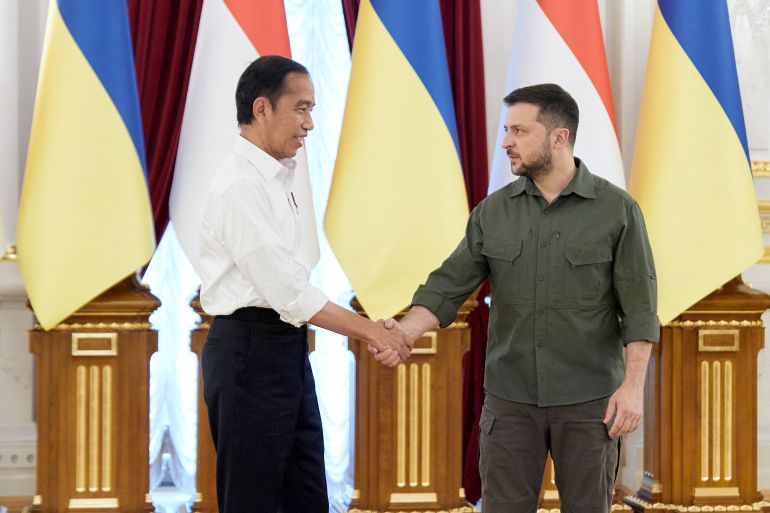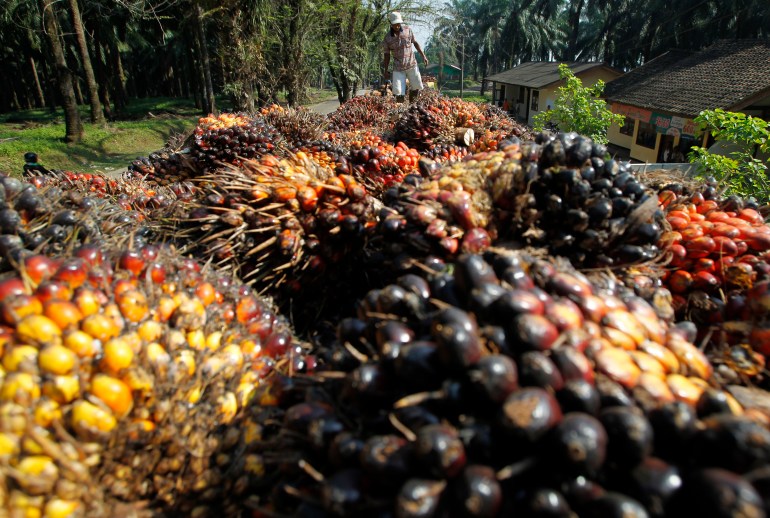Widodo’s Russia-Ukraine trip divides critics in Indonesia
President Joko Widodo visited warring countries as part of efforts to repair disrupted supply chains.

Medan, Indonesia – When Indonesian President Joko “Jokowi” Widodo announced plans to visit Russia and Ukraine last week, he raised hopes of a solution to export blockages that have sent food prices soaring globally.
“War has to be stopped and global food supply chains need to be reactivated,” Widodo said last Sunday before departing for Ukraine, the first trip by a Southeast Asian leader to the region since the war erupted in February.
Keep reading
list of 4 itemsI can turn around Sri Lanka’s economy: PM Ranil Wickremesinghe
US, China talk trade, supply chains as Biden weighs tariff cuts
Fear and anger in India’s Udaipur where Hindu tailor was killed
Striking a similar note, Indonesian Foreign Minister Retno Marsudi stressed the need “to secure a grain corridor” from Ukraine, which is often described as “the bread basket of the world”, and release food and fertiliser exports from Russia.
The war in Ukraine has caused serious disruptions to food production and distribution, particularly for cereals and grains, exacerbating a spike in global food prices that has been fuelled by a confluence of factors, including the COVID-19 pandemic, bad weather and poor harvests.
But for some observers, the high hopes surrounding the trip failed to materialise, with unclear communication adding to a sense of confusion about what was actually achieved.
Following his visit to Moscow on June 30, Widodo on social media expressed his appreciation to Russian President Vladimir Putin for conveying “security guarantees for food and fertiliser supplies from both Ukraine and Russia” and said Indonesia’s only interest was to see “the end of the war soon and the supply chain of food, fertiliser and energy immediately repaired”.

But Radityo Dharmaputra, an international relations lecturer at Airlangga University in Surabaya, said Widodo’s social media posting had created confusion about what Putin had actually said or agreed to.
“There seem to be mixed messages. Putin did not make any promises about fertiliser exports, so it would seem from things like that the trip was not a success,” Dharmaputra told Al Jazeera.
“We don’t know if Putin will do something behind the scenes but this was not based on any public statements and there does not seem to have been a firm commitment made about food and fertiliser.”
Dharmaputra said the optics of the tour were effective, with Widodo’s itinerary playing out in real time as photos of the trip, which included a visit by his wife to a Ukrainian hospital, were uploaded to social media.
“From a communications point of view, it was good for Jokowi’s image, particularly if we look at the domestic media coverage, but it shouldn’t just be about that,” he said.
Dharmaputra said a social media posting in which Widodo said he had been asked to relay a message from Ukrainian President Volodymyr Zelenskyy to Putin – a claim rebuffed by the Ukrainian government – had also called into question the purpose of the “peace mission” as a whole.
“Zelenskyy’s legitimacy depends on him not talking to Putin at all after the tragedies in Ukraine, so it will have been hard for the Ukrainian people to have heard the message from Jokowi,” Dharmaputra said.
“It is possible that Zelenskyy did indeed send a message to Putin via Jokowi, but perhaps he should not have told the public about that. It will be a big problem for Zelenskyy as people will be wondering if he meant that he wanted to meet up with Putin or perhaps give up territory to Russia.”
G20 summit
It is possible the full effect of Widodo’s trip will not be apparent until the G20 summit in November.
Indonesia, which currently holds the annual presidency of the G20, has extended invitations to Putin and Zelenskyy, with the latter reportedly planning to attend via video link.
“Jokowi’s success regarding the visit will depend very much on the follow-up,” Dandy Rafitrandi, an economic researcher at the Center for Strategic and International Studies in Jakarta, told Al Jazeera.
“The war has had a real negative impact on the world economy, including Indonesia’s domestic economy, especially through imported inflation. Indonesia, as the host of this year’s G20, needs to understand that the crisis caused by this war will have the greatest impact on lower-middle-income countries and countries that depend on food and energy imports. These countries are still not fully recovered from the economic crisis caused by the COVID-19 pandemic and must again face increasingly high food and energy prices.”
Rafitrandi said Indonesia could seek to use the G20 as a platform to bridge the divide between Russia and Ukraine.
“In the short term, Indonesia, through the G20, can mobilise commitments and resources from G20 members for the World Food Programme and the Global Alliance for Food Security promoted by the G7 group. In addition, it can call on G20 members not to use export restrictions in conditions of limited global supply, especially for food, fertiliser and energy products.”
Maria Monica Wihardja, a visiting fellow at the ISEAS-Yusof Ishak Institute in Singapore, said the Indonesian leader’s trip could not be separated from the G20 summit and the economic issues that will be on its agenda.
“High on the G20 agenda is global food security,” Wihardja told Al Jazeera, noting that the summit features mechanisms to monitor progress on improving food security, including the Agricultural Market Information System.
“Poor households, low-income countries and countries that are already experiencing humanitarian crises, such as Yemen, Syria and Libya, are hardest hit by the trade disruptions and elevated food prices because of the war in Ukraine.”

Indonesia itself has been deeply affected by food security issues, with Widodo earlier this year implementing a temporary ban on exports of palm oil in response to soaring domestic prices and supply constraints.
Local oil palm farmers have also reported problems sourcing the chemical fertiliser needed to grow their crops, the ingredients of which are mainly imported from Russia, the world’s largest supplier of chemical fertiliser along with neighbouring Belarus.
Zamroni Salim, the head of the Research Center for Macroeconomics and Finance (BRIN) in Jakarta, said Widodo’s trip should be viewed through a realistic lens.
“The visit by the president of Indonesia will not necessarily stop the war but at least it may prevent a more aggressive war,” Salim told Al Jazeera.
“When conflicts do not escalate and the number of warring parties does not increase, the impact on the economy, particularly in terms of price shocks and food and energy supply in the world market, can also be suppressed. So the ‘peace mission’ undertaken by Jokowi may indirectly provide benefits to the global economy.”